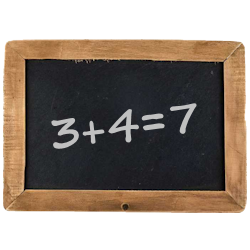The Gauss Series Story
Lesson Plans > Mathematics > Algebra > Functions > Sequences and Series > Arithmetic SeriesThe Gauss Series Story

There is a story about Karl Freidrich Gauss's childhood schooling which makes a wonderful launching point to explaining how to find the sum of an arithmetic series. The story has several variations - some are more or less dramatic than others. The version I use with my classes goes as follows:
When Karl Freidrich Gauss was a child in school, he was an exceptionally gifted student, who was often bored by his classwork. While his classmates were struggling to understand basic concepts, his mind was ranging on ahead to things that the teacher hadn't even taught yet.
Often he would stare off into space, or out the window as he considered more complex topics than his teacher was offering. The teacher would become exasperated with his apparent lack of attention to his school work. One day, while Karl was looking out the window, his teacher scolded him for his inattention, and decided to punish him.
"Take out your slate!" the teacher commanded. "On your slate, add up all the integers from one to one hundred!"
The teacher moved on to other things, assuming that young Mr. Gauss would be wrapped up in this excercise for quite some time. After a minute, he glanced back at Karl, and discovered that the boy was staring out the window again.
"Mr. Gauss!" he snapped, furious. "I expect you to work on the problem I assigned!"
Karl was surprised at his teacher's anger. After all, he had already solved the problem. On his slate he had written exactly one thing - the correct answer: 5050.
How did Gauss do this problem so easily? He reasoned as follows:
The sum can be written like this:
S = 1 + 2 + 3 + ... + 98 + 99 + 100
But it can also be written like this:
S = 100 + 99 + 98 + ... + 3 + 2 + 1
If you add these two equations together, you get an interesting result:
S = 1 + 2 + 3 + ... + 98 + 99 + 100 S = 100 + 99 + 98 + ... + 3 + 2 + 1 _______________________________________ 2S = 101 + 101 + 101 + ... 101 + 101 + 101
Therefore, 2S = 101(100) = 10100, and S = 5050.
I usually do two or three similar examples with my students, and then we extend this into a formula by writing a more generic series:
S = a1 + a2 + a3 + ... + an-2 + an-1 + an S = an + an-1 + an-2 + ... + a3 + a2 + a1 __________________________________________________________ 2S = n(a1 + an)S =

